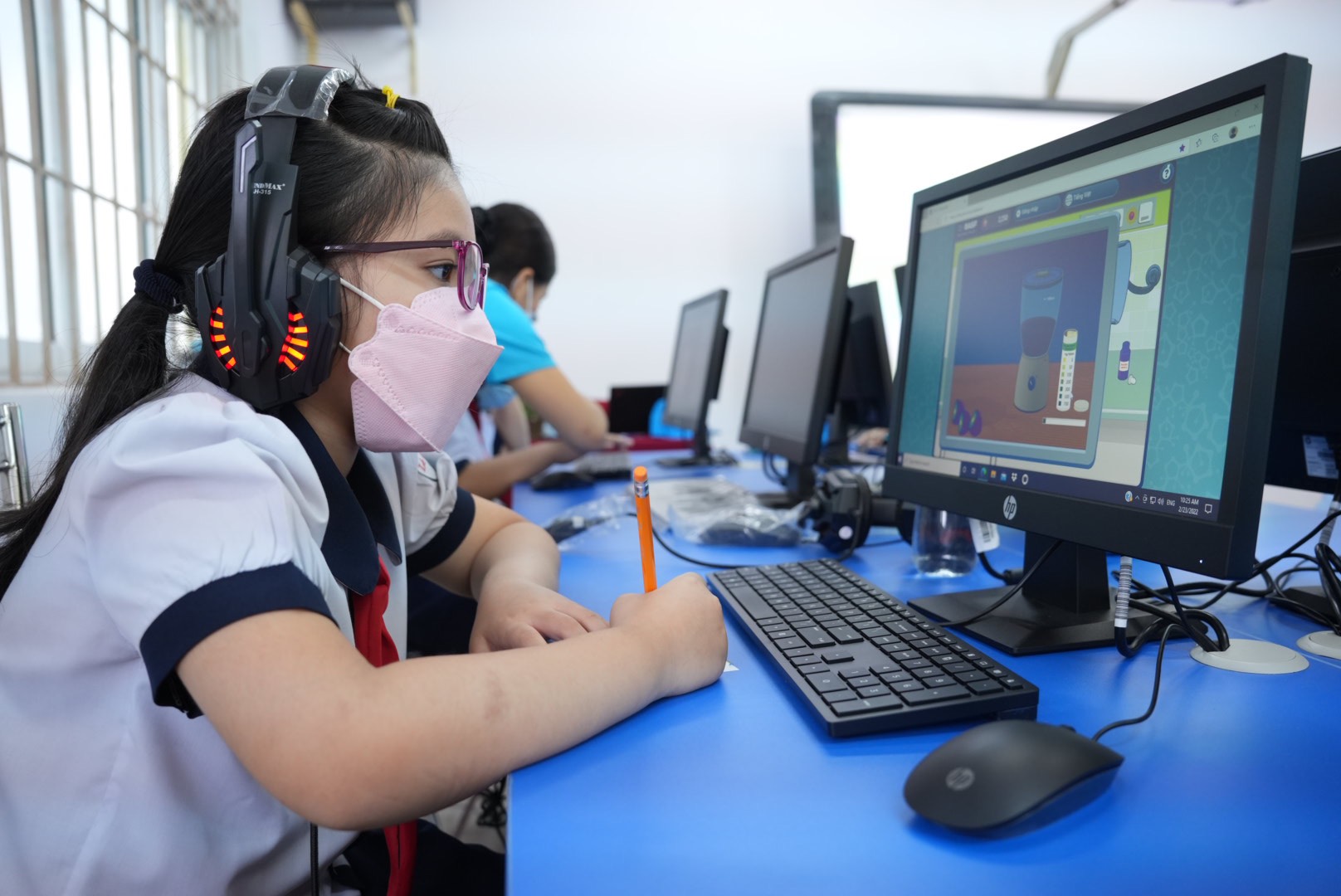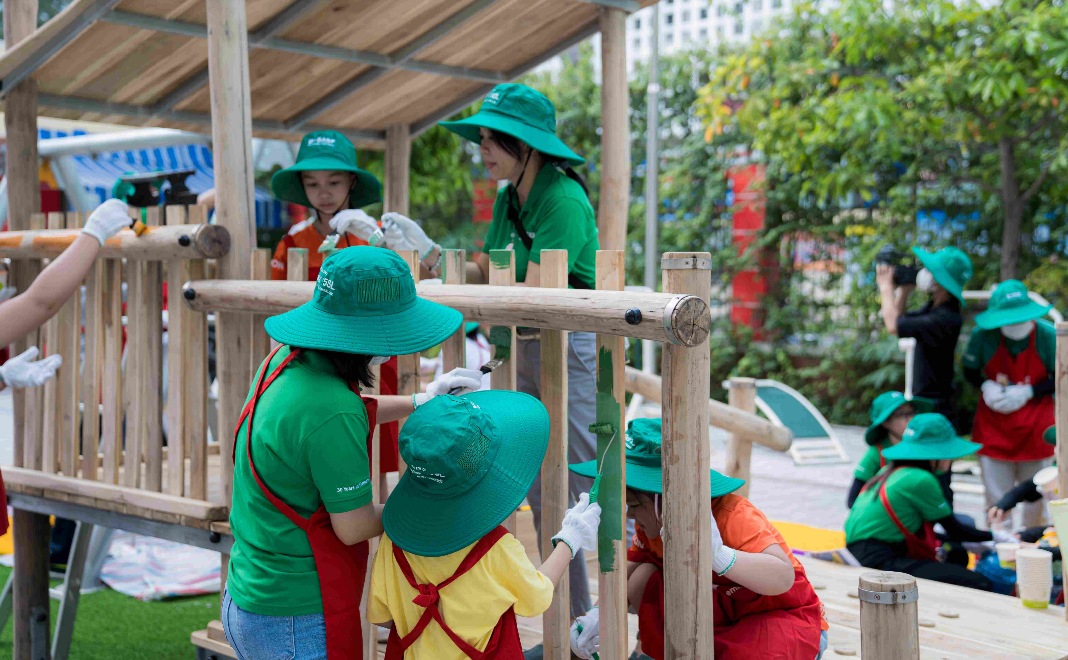On August 23, 2024, at 6 a.m., Nhu Ngoc, a primary student in HCMC, woke up earlier than usual. She had a big day joining her mother and BASF Vietnam’s volunteer group at Nguyen Dinh Chieu Special School in District 10. Together, they decorated, installed and presented BASF Vietnam’s first ever inclusive playground in Vietnam.
“This is one of the many activities to celebrate our 30 years in Vietnam and it aligns with our long-term strategy to support the country’s educational development,” Erick Contreras, managing director of BASF Vietnam, said. The Germany-headquartered chemical company, which has been active in Vietnam since the establishment of its representative office in 1994, remains committed to driving these long-term programs in collaboration with its key business partners, supporting the development of Vietnamese future talents.
Building outdoor playgrounds, connecting children with nature
“We believe child development can be done not just through formal education but also outdoor play. In fact, play activities can help children develop not just cognitive and physical, but also social and emotional skills. It will also ignite their curiosity to explore the world and enhance their creativity by learning through play,” Contreras said.
This newest facility is of special significance to BASF Vietnam as its very first inclusive playground for children with special needs to let them learn, interact, and develop essential skills. The site was carefully designed with structures and colors that provide comfort and safety, and support the development needs of over 200 visually-impaired children. Reflecting BASF’s commitment to sustainability, the playground was constructed using environmentally- and child-friendly materials, including responsibly-sourced eucalyptus wood.
Since 2019, through the social enterprise Think Playgrounds, the company has completed eight facilities, primarily on the outskirts of Hanoi and HCMC, where access to public playgrounds and outdoor activities after school are limited. The facilities are all made from natural materials like wood, ropes, and reusable materials like old tires. It lowers carbon emissions and helps to promote the habit of giving second life to old materials among the next generation.
This year, as BASF marks the 30th anniversary of its Vietnam operations, it aims to elevate this program by engaging the longstanding distribution partners Kien Vuong Co., Ltd., Nagase Vietnam Co., Ltd. , F.D&C Pharmaceutical, and Viet Duc Lubricants & Chemicals, who share the vision of contributing to Vietnam’s sustainable development and leaving positive impact on the local communities.
Renovating schools in remote areas, enhancing access to education
Vietnam has a long tradition of embracing the importance of education and how it can help transform someone’s future. Nevertheless, the country has encountered different challenges, including inadequate educational infrastructure, especially in remote areas like those in the Mekong Delta.
Since 2015, BASF Vietnam has worked together with its long-standing distributors and the non-government organization Saigon Children’s Charity to renovate or build new classrooms in the Mekong Delta. This program has included eight schools in different provinces including An Giang, Hau Giang and Tra Vinh. Along with constructing new classrooms, the program has upgraded the schools’ facilities, including toilets, playgrounds, and fences – allowing the kids to enjoy their school and preparing them for future success.
Of the above facilities, this September, the company will once again break ground on a new school building project at Phuong Ninh Primary and Secondary School in Phung Hiep District, Hau Giang Province. This project will provide four new classrooms and one playground, benefiting 120-150 students aged 6-15 annually upon its completion in the first quarter of 2025.
The school will be refurbished with Green Label Certified products sponsored by Nippon Paint Vietnam. These products, made from sustainable raw materials provided by BASF, will ensure long-term benefits for the school, focusing on health, safety and energy efficiency.
Contreras said, “At BASF, we support the United Nation’s sustainable development goal of providing quality education to the community. Offering the next generation the best start in life with safer and more comfortable learning facilities through school renovation is one of our social engagement priorities.”
Located about 250 km from HCMC, the school is in a remote district of Hau Giang Province in the Mekong Delta, where around 65% of the population is active in agriculture. The existing school, built in the 1990s, is in rundown and unsafe condition for its over 600 students, especially in hot weather or flooding season.
Inspiring the next generation of scientists
As a global leader in the chemical industry, BASF sees investing in the next generation of chemists and generating interest in natural sciences play a crucial role in the local community development and its own success.
Since 2011, in partnership with the HCMC Department of Education and Training, it has offered BASF Kids’ Lab, an interactive education program with hands-on fun activities to help around 5,000 primary students learn about chemistry and its roles in daily life.
In 2018, the company started its BASF Virtual Lab (http://thinghiemvui.basf.com), an online platform that provides 14 interactive chemistry experiments in Vietnamese, allowing schoolchildren to explore the wonders of chemistry with just a few clicks. Children can engage in these activities from anywhere, anytime, playing the role of a junior researcher in a virtual laboratory environment. Each experiment is accompanied by clear and kid-friendly explanations from Dr. Bubbles, the animated Kids’ Lab mascot, making complex concepts understandable and enjoyable.

Also in partnership with the education department, the company donated computer sets to different schools in HCMC’s districts Nha Be, Binh Tan and 7 to help about 2,500 students and their teachers familiarize themselves with the fascinating online experiments and gain access to computer science and technology contributing to Vietnam’s STEM education.









